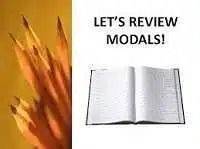MODALS – MODAL AUXILIARIES
Modal auxiliaries are helping verbs which are not affected by person or gender, e.g.. will, would, shall, should, may, might, can, could, ought, must, dare, need using too.
These auxiliaries express the mode or manner of the actions denoted in the main verb.
The peculiar nature of the Modals is that :
(i) They are never used alone. They must have a principal verb with them.
I can play the violin.
(ii) They have the same form throughout whatever the person and number of the subject.
I can run; they can rum you can run.
(iii) They do n’t have infinite or participle form. We can’t use ‘to’ with them or the past participle form or write ‘can driven’ etc. In most cases, they show present or future time.
USE OF MODALS
1. Shall
(i) To express future with the first person (I, we):
- I shall sing a song tomorrow.
- We shall play a match in the evening.
(ii) To express a command, threat or promise :
- You shall leave this place at once. (Command)
- If you make a noise, you shall be punished. (Threat)
- He shall get a prize if he wins the match. (Promise)
(iii) In interrogative sentences, shall is widely used with the first person to indicate after or suggestion and with the third person to know the desire of the person spoken to :
- Shall I make a cup of tea for you (Otter)
- Which book shall I buy (asking to suggest)
- Shall the porter carry your box upstairs? (Do you want it so?)
- Shall the messenger wait for the reply? (Do you want the messenger to wait ?)
(iv) In a complex sentence, however, ‘will’ and ‘shall’ are always used in the principal clause and never in the subordinate clause :
- I shall help him W he works for me. :
Note: ‘Will’ is used in the doubtful case.
2. Should (Past form of Shall)
(i) To express dray or obligation.:
- We should keep our word.
(ii) To express supposition:
- If I should meet him now. he will not recognise me.
(iii) To express advice :
- You Should not tell a lie.
(iv) To express condition :
- Should this happen, I will resign.
(v) As past tense of shall in indirect speech:
- I said that I should sing a song the next day.
- (I said, “I shall sing a song tomorrow.” — Direct)
(vi) After lest (showing fear) :
- Walk carefully lest you should stumble.
3. Will
(i) In the second person and third person to express simple future time :
- He will go home today (Third person)
- You will admit that he was in the wrong. (Second person)
(ii) To express intention, promise, threat and determination :
- I will go home today (Intention)
- I will try to do better next time. (Promise)
- I will avenge his death. (Threat)
- I will do or die. (Determination)
(iii) To express assumption, a request :
- Will you please open the door? (Request)
- He will be here at any time. (Assumption)
(iv) To indicate characteristics or habit, insistence, the invitation :
- He will be talking all the time without doing anything. (Habit)
- This machine will work very well and will g not give any trouble. (Characteristic)
- Will you have tea? (Invitation)
- He will not follow my instructions. (Insistence)
Note: In the interrogative sentence, a will is never used with the first person.
4. Would (Past form of will)
(i) As past tense of will in indirect speech :
- He told me that he should go to Delhi. (He said to me, I will go to Delhi.” —Direct)
(ii) To express a habit in the past
- He would sit all day with the book in his hand.
- (Here would can he substituted by used to.)
(iii) To express willingness :
- I would do my best to satisfy you.
(iv) To express a wish :
- Would that I were wealthy!
(v) To express a request :
- Would you please open the door? (‘would you’ ? is more polite than ‘will you’ ?)
5. Can
(i) To express ability :
- I can swim across a river.
(ii) To express permission :
- You can go now.
(iii) To express possibility:
- This road can be blocked. (A theoretical possibility)
Note: Can indicate a theoretical possibility and may a factual possibility.
- Can never express past time. In the past: and the future tense forms are was/ were able to and shall/ will be able to.
- He was not able to solve the problem. (Past)
- I hope he will be able to solve the problem, (Future)
6. Could (Past form of Can)
(i) As past tense of the can in indirect speech :
- He said that he could solve the problem.
- (He said, “I can solve the problem.” —Direct)
(ii) To express ability in the past :
- I could swim across the river when I was young.
(iii) To express a polite request :
- Could you please let me have your book?
(iv) To express possibility :
- This road could be blocked.
(v) To express permission Could I use your telephone?
7. May
(i) To express permission:
- You may not go.
- May I come in?
(ii) To express possibility:
- He may come today.
- The road may be blocked today due to the procession.
(iii) To indicate a purpose :
- We eat that we may live.
(iv) To express a wish, faith or hope :
- May you live long!
- May his soul rest in peace!
8. Might (Past form of May)
(i) To express a suggestion :
- He might join college.
(ii) To express less possibility :
- He might win a prize.
(iii) To express purpose :
- He worked hard that he might live.
(iv) ‘Might’ is the past, form of ‘May :
- He said that Rain might come.
- (He said, “Ram may conic.- — Direct)
(v) To express permission :
- Might I begin my lecture?
(vi) To express guess :
- That might be the peon.
9. Must
(i) To express compulsion :
- You must carry out my orders.
(ii) To express. determination :
- I must finish the work by next Tuesday at any cost.
(iii) To express some strong possibility :
- There must be some mistakes somewhere :
(iv) To express obligation or duty:
- You must follow the orders of your seniors.
Note: In the negative or interrogative, must is not used in this sense. Instead of it, can is used.
10. Ought (always followed by a to-infinitive)
(i) To express moral obligations, duty or desirability:
- You ought to love your elders.
Note: The idea of obligation can also be expressed with should or must. However, ought to is used when a feeling of duty is involved. The negative form of ought to is ought not to.
(ii) To express probability/to give advice :
- The person ought to be humble.
11. Dare
Dare as a modal auxiliary means ‘be bold enough to’. It is commonly used in interrogative and negative sentences.
- He dare not fight with me.
- She does not dare speak to her father.
Note: It does not take’s’ in the third person (singular) in Present Tense.
- When it occurs u without ‘do’ it takes an infinitive without ‘to’.
- He dare not do it.
12. Need
Need is used to express necessity in negative and interrogative sentences. It does not take in the third person. Singular, present tense and takes for its objects an infinitive without ‘to’.
- He need not go.
- Need I go there?
- You need not have wasted your time in gossips. (Negative)
13. Used to
(i) To express past habit :
- I used to play in that playground when I was a child.
(ii) To express the existence of something in the past:
- There used to be an open ground long ago.
Worksheets and Exercise Are:-
Modal Verb Rules, Exercises and Worksheets No. 1 & 2
Modal Verb Rules, Exercises and Worksheets No. 3 & 4
Modal Verb Rules, Exercises and Worksheets No. 5 & 6
Modal Verb Rules, Exercises and Worksheets No. 7 & 8
Modal Verb Rules, Exercises and Worksheets No. 9 & 10
Modal Verb Rules, Exercises and Worksheets No. 11 & 12
Modal Verb Rules, Exercises and Worksheets No.13 & 14

